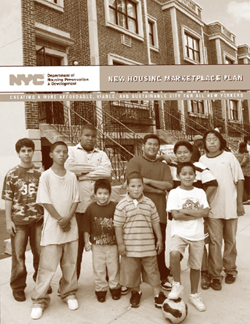Filed Under > Research/Publications
Quantifying the Impact of Affordable Housing
Teachers College and the Mayor's Fund to Advance New York City have been awarded $1 million by the John D. and Catherine T. MacArthur Foundation, to fund an ongoing study of the effect of affordable housing on low-income families.
By Patricia Lamiell
Teachers College and the Mayor’s Fund to Advance New York City have been awarded $1 million by the John D. and Catherine T. MacArthur Foundation, to fund an ongoing study of the effect of affordable housing on low-income families.
The study will be led by TC’s Jeanne Brooks-Gunn, co-founder of the College’s National Center for Children and Families; and Elyzabeth Gaumer, Director of Research at New York City’s Housing Preservation and Development Corporation (HPD). It will quantify the impacts of affordable housing on financial stability, housing quality, and physical and mental health, as well as school outcomes for children, extending work funded by a $3.1 million grant from the National Institute for Child Health and Human Development at the National Institutes of Health awarded last summer.
The study represents a successful collaboration among public and academic institutions that will support more coordinated and integrated policymaking in the fields of housing, public health, and education.
“The award is an acknowledgement of the innovative, data-driven research being done in New York City aimed at changing the way we think about how government can and should work,” Mayor Michael R. Bloomberg said in a statement. “It represents the largest award of the current round of MacArthur Foundation grants, and, combined with grants from the National Institute for Child Health and Human Development at the National Institutes of Health and a previous grant from the MacArthur Foundation, the total funding for the study now sits at $4.4 million.”
“This collaboration of Teachers College with New York City agencies is an opportunity to directly influence policymaking through scientific research,” said Brooks-Gunn, who is the Virginia and Leonard Marx Professor of Child Development and Education at TC and the College of Physicians and Surgeons at Columbia.
Gaumer said it illustrates HPD’s and the city’s “dedication to evidence-based policymaking,” and the MacArthur Foundation’s “recognition of the important work we’re doing and its value at a national level.”
The HPD study is one of 10 funded by the MacArthur Foundation’s “How Housing Matters” project, and the only one to receive the maximum grant of $1 million. The NYC Housing and Neighborhood Demonstration Project will follow 3,000 families who apply by lottery for housing under this program. They will follow about 1,500 who receive housing in one of eleven newly constructed rental developments, compared to about 1,500 who apply but do not receive housing.
The research will be used to evaluate affordable housing produced as part of the New Housing Marketplace Plan, the largest municipal affordable housing plan in U.S. history, which will dedicate $8.5 billion for the construction or preservation of 165,000 units by 2014. This study will provide the first evidence of its kind on how changes in housing and neighborhood conditions can improve the lives of low-income New Yorkers. HPD is the largest provider of affordable housing in the country.
Brooks-Gunn and Gaumer said the study represents a shift in attention from the very poor who live in public housing, to the working poor, some of whom have less disposable income than families on welfare but do not qualify for subsidies. Investments in housing can support households that are struggling to make ends meet in multiple ways, beyond the provision of safe and affordable housing – especially in New York, where housing costs are among the highest in the country. Early findings show that moving to affordable housing leads to significantly lower asthma symptoms and better mental health, reduced financial strain and lower housing cost burdens, improved housing quality, and access to safer neighborhoods.
In addition to Brooks-Gunn and Gaumer, the research team includes partners from The New York Academy of Medicine, New York University’s Furman Institute for Real Estate and Urban Policy, University of Michigan, UCLA, and Harvard University, as well as policy researchers at the NYC Department of Health and Mental Hygiene.
Published Monday, Feb. 7, 2011

